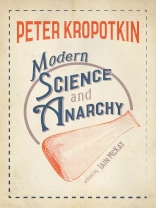This was Peter Kropotkin’s final book, in which he theorizes about the development of the modern state and how modern science and technology can assist in freeing working people from capitalism. First published in 1912 in France, sections of this book have been translated and published in English (as short books and pamphlets and journal articles), but never as a whole work as Kropotkin intended. More than 10 percent of this book has never before appeared in English. Introduced and annotated by Iain Mc Kay.
Mục lục
Introduction: Reality has a Well-known Libertarian Basis, by Iain Mc Kay
Preface
Part I: Modern Science and Anarchy
I. The Origins of Anarchy
II. The Intellectual Movement of the Eighteenth Century
III. The Reaction at the beginning of the Nineteenth Century
IV. The Positive Philosophy of Comte
V. The Awakening in the Years 1856-1862
VI. The Synthetic Philosophy of Spencer
VII. The Role of Law in Society
VIII. The Position of Anarchy in Modern Science
IX. The Anarchist Ideal and Previous Revolutions
X. Anarchy
Principles
Anarchist Ideas amongst the Ancients; in the Middle Ages—Proudhon-Stirner
XI. Anarchy (continued)
Socialist Ideas in the International—Authoritarian Communists and Mutualists
Socialist Ideas in the International—Saint-Simonism
XII. Anarchy (continued)
Socialist Ideas in the International—Fourierism
The Impulse given by the Commune—Bakunin
XIII. Anarchy (continued)
The Anarchist Concept as it appears today
The Negation of the State
The Individualist Current
XIV. Some Conclusions of Anarchy
XV. The Means of Action
XVI. Conclusion
Part II
Communism and Anarchy
I. Anarchist Communism
II. Authoritarian Communism—Communist Communities
III. Small communist communities. Causes of their failures
IV. Does Communism imply the diminishing of the individual?
Part III
The State: Its Historic Role
Part IV
The Modern State
I. The Essential Principle of Modern Society
II. Serfs of the State
III. Taxation as a Means of Increasing the Power of the State
IV. Taxation a Means of Enriching the Wealthy
V. Monopolies
VI. Monopolies in the Nineteenth Century
VII. Monopolies in constitutional England and Germany—Kings of the epoch
VIII. War
Industrial Rivalries
High Finance
IX. War and Industry
Industrial crises due to anticipation of war
X. The Essential Characteristics of the State
XI. Can the State be used for the emancipation of the workers?
XII. The modern constitutional State
XIII. Is it sensible to strengthen the current State?
XIV. Conclusions
Part V
Appendix
I. Explanatory Notes
II. Hebert Spencer: His Philosophy
Supplementary Material
Anarchy: Its Philosophy, Its Ideal
A lecture which was to be held on March 6th, 1896, in the Tivoli-Vauxhall theatre in Paris
Co-operation: A Reply to Herbert Spencer
Index
Giới thiệu về tác giả
Peter Kropotkin (1842-1921) was one of anarchism’s most famous thinkers. His classic works include
The Conquest of Bread;
Fields, Factories and Workshops;
Memoirs of a Revolutionist; and
Mutual Aid: A Factor of Evolution. Iain Mc Kay is editor of
An Anarchist FAQ (Vols. I and II),
Direct Struggle against Capital: A Peter Kropotkin Anthology, and
Property is Theft!: A Pierre Joseph-Proudhon Anthology.












